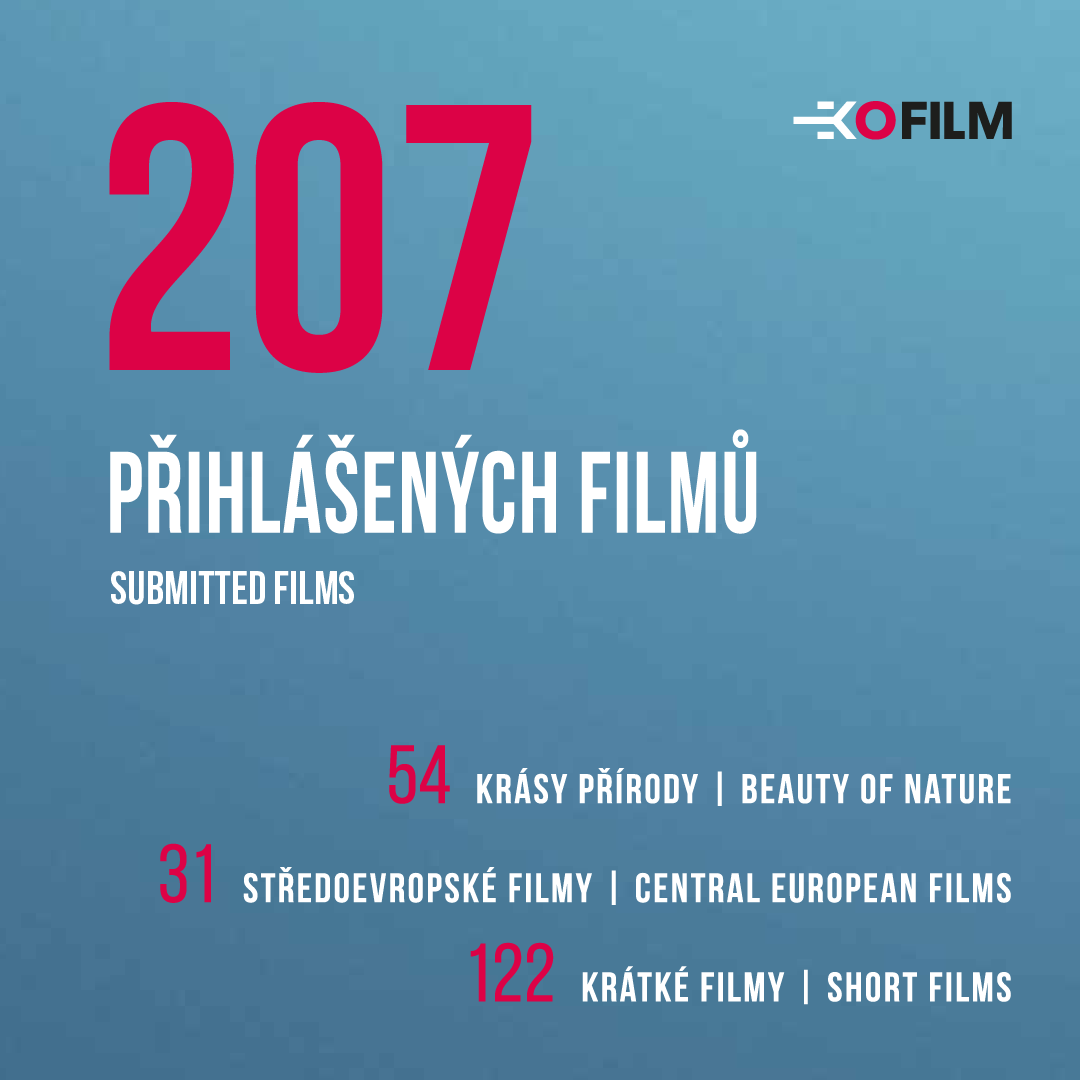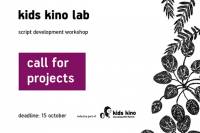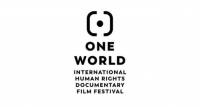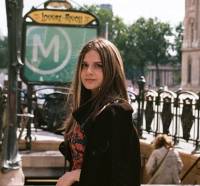Call for projects for the Kids Kino Lab, international script development workshop is now open! Are you ready to develop your story? Submit your project of a film or series for young audiences before 15th October.Kids Kino Lab – script development workshopKids Kino Lab is dedicated to scriptwriters and producers who are interested in developing films or series (live action, animation or documentary) for kids and youth.12 teams (producer + scriptwriter) will be developing their projects from a short synopsis to the advance draft of the script together with production basics (estimated budget, financing and promotion plan). The programme of the Kids Kino Lab is enriched with sessions with invited guests and experts from the fields of scriptwriting, distribution, sales and many others. The programme of the ongoing edition which will end in September can be found here.Individual and group workThe teams will be divided into three script development groups lead by one of our Script Tutors: Kirsten Bonnén Rask, Armin Prediger, Philip LaZebnik. Producers from each Team will have a chance to work on the development of their projects under the supervision of Ronald Kruschak, our Producers’ Tutor.General information
- Kids Kino Lab is open to the projects from all the European countries.
- The workshops will be conducted in English.
- The cost of the programme is 1600 EUR per team (2 people, each additional team member needs to pay 800 EUR). This covers experts and tutors, hotels and food.
- The programme lasts nine months.
- 7th edition of Kids Kino Lab consists of four stationary group sessions (5 days each) and three online consultations with the lead Tutors.
- Each session of the workshops takes place during a film festival for children or an industry event.
Schedule*:The programme kicks off at the beginning of 2022. During each session the Participants together with the Tutors will work on the next stages of the script development process.Session I – Synopsis
Session II – Treatment
Session III – First draft of the script
Session IV – Second draft of the scriptMore detailed workflow of the workshop and application form can be found on Kids Kino Lab website.READY TO DEVELOP YOUR STORY?Apply NOW
Discover projects taking part in ongoing edition of the Kids Kino Lab!Join the pitching presentation of the projects during the Kids Kino Industry forum (28.09 - 1.10.2021, hybrid edition) and meet our Tutors. More details soon!
Kids Kino Lab is an industry part of Kids Kino International Film Festival.The programme is co-financed by the MEDIA sub-programme of Creative Europe and Polish Film Institute.Kids Kino Lab partners are: Zlin Film Festival, JEF Festival, Kids Kino Industry.More information about partners from the ongoing edition can be found here: https://www.kidskinolab.pl/partners/.If you have any questions, please contact This email address is being protected from spambots. You need JavaScript enabled to view it..
ONE WORLD INTERNATIONAL HUMAN RIGHTS DOCUMENTARY FILM FESTIVAL, 24th EDITION
March 21 – April 3 2022 in Prague
Followed by regional screenings in over 30 towns around the Czech Republic and Brussels.
We would like to invite you to submit your film to the 24th edition of the festival. One World has grown over the years to become the largest human rights film festival in the world. It is one of the leading cultural events in Prague and the Czech Republic.
We are looking for:
- Feature or mid-length creative documentaries finished in last 2 years (2020 - 2022) - minimum length is 40 minutes
- Interactive films for virtual reality
- Doc for kids - short documentaries and animated films for children (no experimental films)
Creative documentaries on human rights, social, political, environmental, and media issues will be selected based on the quality of the filmmaking and the power of their stories.
Selected film are screened in three competitive categories:
- International Competition for creative documentaries,
- Right To Know Competition for documentaries making an exceptional contribution to protecting human rights and
- Czech Competition for local documentaries; and several non-competitive thematic categories.
For competitive categories, we prefer World and International premieres in case you plan to premiere your film at One World Festival, please contact us for more information at This email address is being protected from spambots. You need JavaScript enabled to view it..
A submission will be charged to cover administrative costs:
Feature and mid-length documentaries: 20 EUR
Docs for Kids: 15 EUR
The fee will be waived for selected countries of production (more information in the submission form).
FILM SUBMISSION DEADLINE: SEPTEMBER 1, 2021
EXTENDED FILM SUBMISSION DEADLINE: NOVEMBER 1, 2021 (for films finished between September and November 2021)
34 short films in the Bucharest International Dance Film Festival 2021 competition
Press releases 26-08-2021BIDFF- Bucharest International Dance Film Festival 2021 is announcing the 7th edition competitions: 28 short films in the international competition and 6 Romanian titles in the national competition, picked from over 400 short films submitted.
The festival will take place between 1-5 September 2021, under the theme Potential Worlds.
Nature and industrialization collide head-on in the international competitive section of BIDFF. Directors and choreographers from 20 countries present cinematic experiments, audio-visual meditations, futuristic worlds, performative rituals and musical avatars in virtual cities, in a fusion of cultures and styles, in which man redefines his identity in relation to the world he belongs to.
The short films selected by BIDFF in 2021 are:
- „Beyond” (d & c: Simone Wierød, PL/TW/HK/TH/DK)
- „They Saw the Sun First” (d: Stefan Hunt, c: Vanessa Marian, AUS)
- „Scapelands” (d: Katie Beard și Naomi Turner, c: Liv Lockwood, UK)
- „Human Habitat” (d & c: Flavia Devonas Hoffmann, NO)
- „Memories of the Future” (d & c: Dance collective Arnhemse Meisjes, NL)
- „Moving Barcelona” (d: Jevan Chowdhury, c: Alexander Eckman, UK)
- „The Soft Bit” (d: Jana Irmert, DE)
- „Through Glass” (d: Marek Partyš, c: Sylva Šafková, CZ)
- „Utro” (d: Polina Mirovskaya, c: Jeroen Janssen, Polina Mirovskaya, NE)
- „Toke” (d: NONO, c: Stuart Shugg, UK)
- „Salidas” (d: Michael Fetter Nathansky, c: Christiane ‘La Mona’, DE)
- „Weakness of the Flesh” (d: Kevin McGloughlin, Jacob Jonas, c: Jacob Jonas, USA)
- „Dive” (d: Oscar Sansom, c: Sophie Laplane, UK)
- „Fibonacci” (d: Tomáš Hubáček, c: Marie Gourdain, CZ)
- „Still Life - Tabeo” (d: Ryan Renshaw, c: Jack Lister, AUS)
- „All, or Nothing at all” (d: Margit Lukács și Persijn Broersen, c: Prakesh Baksii, DK/NL)
- „D3C05” (d: Blaze Gonzalez, Hannah Gaengler, c: Liony Garcia, USA)
- „Beast” (d: Benjamin Nicolas, CAN)
- „Insomnia: Violent Nights” (d: Emilia Izquierdo, UK)
- „Color Me” (d: Martin de Thurah, DK)
- „Your Coffee, Please” (d: Irina Kononova, RU)
- „Ghosts and All” (d & c: Ayano Yokoyama, JP)
- „Ulrichs 1867” (d & c: Sven Niemeyer, DE)
- „Voguing with Beethoven” (d: Emilie Norenberg, c: Emma Damskau, NO)
- „Belia” (d & c: Eman Hussein, EG)
- „The Circadian Cycle” (d: Garry Stewart, c: Garry Stewart și dansatorii Australian Dance Theatre, AUS)
- „The Kitchen” (d & c: Vishwakiran Nambi, IN)
- „Shelly Belly inna Real Life” (d & c: Cecilia Bengolea, FR/AR)
The Romanian competition includes six titles, created or co-created by Romanian directors and choreographers. The relationship with nature, ways of reacting to chaos, collaborative processes involving dance, music, poetry and cinema, exploring the collective body and critique of contemporary media visions of a perfect body are themes and topics that concern young local dance filmmakers. How can we rethink our journey through life? - is one of the questions raised by this short and intense selection, which includes the following headings:
- „Breath” (d: Cătălin Rugină și Maria-Luiza Dimulescu, c: Maria-Luiza Dimulescu)
- „Public Figure” (d: Mădălina Zaharia, c: Daniel Hay-Gordon)
- „Calcar” (d & c: Georgeta Corca)
- „Pretty UGLY” (d & c: Corina Andrian)
- „Almost” (d: Tobin Del Cuore, c: Ana Maria Lucaciu & Răzvan Stoian)
- „Ship of Fools” (d: Gabriel Durlan, c: Alexandra Bălășoiu, Virginia Negru, Denis Bolborea & Cătălin Diaconu)
Marlene Millar, one of the most famous dance film creators in Canada, along with Saddo, Romanian artist, illustrator and muralist and Bogdan Theodor Olteanu, Romanian film and theater director are the members of the Jury.
BIDFF awards excellence, novelty and courage in filmmaking with a prize pool of 1500 euros for the Best International Film and the Best Romanian Film.
The most popular streaming services, telecoms and TV channels are coming to Croatia to discuss trends in the TV industry that have emerged after a year that had a great influence on all media.
16th of August 2021 – NEM Dubrovnik 2021 presents its agenda which will, under the new concept, gather the leaders in global and European TV industry, TV channels, telecoms, sport streaming, distribution and production representatives. Most of the program will be held in the open, according to determined epidemiologic measures. All three evenings are part of a new concept prepared by NEM Dubrovnik for the first time.
For four days, from 6th till 9th of September 2021, in the beautiful Hotel Dubrovnik Palace, there will be talk about TV content, formats, technologies and trends which are creating the future of this dynamic industry. This year's program is organized in market, lectures, panels and screenings and unavoidable daily and nightly gatherings:
- Day one opens with a welcome speech by Pavel Stantchev, CEO of the biggest Hungarian media group TV2 Media Group. It is followed by the panel “The Next Generation of EON Television: From TV to Entertainment Platform” of the leading telecom and media services provider in the Southeast Europe – United Group, and the day closes with the presentation and screening of a leading Russian TV network in the entertainment field, GPM Entertainment Television. The first evening will be held on the roof of the Hotel Dubrovnik Palace, with a view of the sunset.
- Day two starts with the TV Tech Showcase, where Synamedia, SeaChange, Whip Media and Bitmovin will present their technological TV solutions. After that, a keynote speech and a presentation will be held by Peter Parmenter, SVP Business Development at DAZN, biggest sport streaming service in the world. Leading internet television in Germany, Switzerland and Austria – Zattoo will present their work on stage, afterwards.
One of the most current TV industry topics will not skip NEM Dubrovnik – on the panel “Is Streaming the Future of Sports?” there will be talk about streaming as a means by which we will potentially more often follow sports events in the future. Also, on the panel “Age of Streamers: What is the Audience Asking for? How Important is Local Original Content for Streamers?” there will be discussions about TV formats that best respond to the current audience and how important local content really is. The dynamic day is followed by networking relaxation with cocktails sponsored by Play Premium (RTL Croatia) and an evening party sponsored by Prva TV.
- Day three starts with the panel “Why We Love TV Industry”, during which longtime and experienced leaders will talk about their passion for the TV industry. After that, you’ll see the panel “The Battle for Eyeballs – How Today’s New Distribution Models Create Opportunities for New Service Providers” sponsored by NAGRA, a digital TV division of the Kudelski Group company, specialized in digital security and media systems for delivering digital and interactive content. On the panel “Premieres or Well-known Content?” sponsored by Prva TV television, we will talk about the difference in success and cost-effectiveness of premier and recognizable TV content for the final user.
Visitors will be introduced to the global media company SPI, whose numerous channels and digital services are available on six continents, the French technology company Broadpeak, and the Croatian Atlantic Grupa, through a presentation of their findings and practices on retaining the attention of the target group.
Important part of every NEM Dubrovnik is the exclusive presentation of new TV content. As part of this year’s first-ever Beta Night, on the beautiful location by the sea, the crime series “The Silence” produced by Drugi Plan and HRT in collaboration with Beta Film and Star Media, will celebrate its world premiere in attendance of lead actress Kseniya Mishina. In addition, the Russian thriller series “Dead Mountain – The Dyatlov Pass Incident” by 1-2-3 Production will be presented, followed by a Q&A with Berlinale Silver Bear winner and co-director Pavel Kostomarov. In 2020, the German production, financing, and distribution company Beta Film acquired a major stake of the most popular Croatian production company Drugi Plan, responsible for production of the series “The Silence” (Šutnja). Beta Film handles international sales for both series.
For three days, NEM Dubrovnik will host a TV market where participants can present their companies, TV content, services and products, but also negotiate potential cooperation, and the fourth and the last day is reserved for collecting impressions and summarizing new knowledge and experiences. As every year, the unavoidable part of NEM Dubrovnik experience are gatherings with welcome drinks, coffee breaks and parties in partnership with some of the most prominent partners of NEM Dubrovnik 2021 market, on whose official page you can find a list of currently confirmed sponsors and visitors.
Indispensable B2B event in the CEE region
NEM Dubrovnik is a B2B event, every year focusing on the TV industry development in the CEE region. Regular visitors are key representatives of pay-tv channels, FTA channels, streaming services, telecom operators, and other television services providers, but also actors, producers, directors, writers, and other participants in the audiovisual industry. This year, Dubrovnik will also host the finalists of the NEM Network screenplay writing competition, who will get the chance to meet with potential partners, buyers and/or investors from the industry.
Thus far, NEM Dubrovnik was supported by more than 180 influential companies on the global and local level, some of which are Eutelsat, Deutsche Telekom, A1 Telekom Austria Group, United Group, Comcast, Irdeto, Global Agency and HBO Adria, as well as BBC Studios, ViacomCBS, All3Media International, NBCUniversal, Warner Bros., Fremantle, Sony Pictures Television, Pickbox, MGM, ITV Studios Global Entertainment, Viasat World, Telekom Srbija Group, ZDF, BETA Film, HRT, Nova TV, RTL Croatia, RTL Hungary and many others.
New Europe Market
New Europe Market (NEM) is a collective name for several events organized by the marketing and TV industry agency Mediavision. With an already traditional NEM Dubrovnik, 2019 saw the introduction of a winter edition called NEM Zagreb, dedicated to the creative side of the TV industry. During the challenging 2020, the new platform NEM Network was introduced, so that the professionals could stay connected regardless of the physical travelling restrictions.
Details of the program for NEM Dubrovnik 2021 will come in the following weeks. You can find all the information about the event and the cost of participation fees on the official NEM Dubrovnik 2021 site.
The 25th Baltic Sea Forum for Documentaries will run on 1-12 September in Riga and online, with a total of 18 film projects to be presented at the training and pitching forum, as well as a programme of masterclasses and film screenings.
Baltic Sea Forum for Documentaries, established in 1997 in Denmark, will be hosted in Riga for the 17th year where the forum for documentary industry professionals has been complemented with a public film programme.
“We are very happy to see that over the 25 years Baltic Sea Forum for Documentaries has retained its position as an important and necessary event for film professionals from the Baltic Sea region, Eastern Europe and beyond. It has been a springboard for many filmmakers in the past, and it continues to be such a platform. Films from recent editions have enjoyed great festival runs – like “The Earth is Blue as an Orange” by Iryna Tsilyk, “Courage” by Aliaksei Paluyan, or Antonia Kilian’s “The Other Side of the River” and many others. Even though this anniversary edition will be held in a hybrid form with just a few onsite participants, we will make every effort to have as productive an event as possible, and we do hope that next year we will be able to welcome everyone in Riga again,” comments project manager of the forum Zane Balčus.
18 film project representatives from 17 countries will first participate at a three day workshop aimed at enhancing the participants' presentations prior to the upcoming pitching sessions. The training will be led by seven tutors: the documentary film consultants Tue Steen Müller and Mikael Opstrup (Denmark), Salomé Jashi (Georgia), director of “Taming the Garden” (2021) and “The Dazzling Light of Sunset” (2016), documentary expert Gitte Hansen (Switzerland), film editor Phil Jandaly (Sweden), producer, director and head of programmes at Estonian Television Marje Tõemäe (Estonia), and film director and scriptwriter Dāvis Sīmanis (Latvia).
The pitching sessions on 8-9 September will take place online, with representatives from the Baltic countries (Estonia, Latvia, Lithuania) present at the Baltic Sea Docs studio in Riga. The projects will be presented to a number of decision makers from TV channels, sales and distribution companies, film funds and industry events such as Cat & Docs (France), Syndicado (Canada), Taskovski (UK), BBC (UK), NHK (Japan), EER (Estonia), LTV (Latvia), YLE (Finland), ZDF / Arte (Germany), Current Time TV (USA), Al Jazeera (Qatar), SVT (Sweden) and others. Selected projects will be awarded with prizes from partners Documentary Association of Europe and post-production company BB Post House.
Additionally, on 6 September Baltic Sea Docs will host two masterclasses (available online to forum participants and general audience upon prior registration)—by the Lithuanian producer Dagne Vildžūnaite and Latvian film director Laila Pakalniņa (both moderated by Tue Steen Müller).
The industry event programme will also feature a seminar on film distribution while the traditional methods are blocked, focusing on how and why this hurts documentaries. The seminar, organised by the Creative Media Office of Latvia, will be led by Gitte Hansen on 7 September.
For the fifth year, Baltic Sea Docs will partner with Artdocfest, a festival and industry platform for independent filmmakers from the former Soviet Union. A selection of 10 film projects will be presented at the Artdocfest pitching session on 8 September.
In parallel to industry events, Baltic Sea Docs will present a film programme of international documentaries to the wider public, with Aliaksey Paluyan's “Courage” (2021) as the opening film. “Courage” follows three actors of an underground theatre in Minsk during the democratic protests against the president Lukashenka's regime. The film was presented at Baltic Sea Docs pitching forum in 2020 and received the Current Time TV award.
In addition to the cinema programme, Baltic Sea Docs will mark its 25th edition with a special anniversary film selection showcasing nine films that have been, throughout the years, presented at the forum at a project stage. The anniversary programme will be screened on the platform www.filmas.lv administered by the National Film Centre of Latvia (organiser of Baltic Sea Docs), and three of the titles will be available for viewers worldwide on 12 September: the long-time forum participant Ivars Seleckis' “New Times at Crossroad Street” (1999)—the second film in the trilogy about the inhabitants of the small street in Riga; one of the most internationally acclaimed Lithuanian documentaries, Arūnas Matelis' “Before Flying Back to the Earth” (2005); and Maj Wechselmann's film following the life story of her mother Regina Korinman, “My Mother” (2017).
Baltic Sea Forum for Documentaries is organised by the National Film Centre of Latvia and supported by the Ministry of Culture of the Republic of Latvia, State Culture Capital Foundation (special programme “KultūrElpa”) and Riga City Council. More information about the selected film projects and the event is available on the forum homepage: http://balticseadocs.lv
FNE Podcast: Mihai Chirilov: Artistic Director: Transilvania International Film Festival
Romania 27-07-2021CLUJ-NAPOCA: FNE spoke to Mihai Chirilov, Artistic Director of the Transilvania Film Festival about the challenges of the 2020 and 2021 editions of the festival which took place on site each year despite the COVID pandemic. The festival managed to screen more than 100 films in 2020 using outdoor venues throughout the town and discovering new locations. In 2021 the festival returned to traditional cinemas at 70% capacity and was able to invite many foreign guests and filmmakers including international dance star Sergei Polunin.
107 Documentary films about the environment want to succeed at this year’s edition of EKOFILM IFF
Festivals 26-07-2021There are 50% more entries than last year, from 34 countries and 5 continents.
BRNO/PRAGUE/CZECH REPUBLIC – More than 200 documentary films have been submitted to the 47th edition of the International Film Festival about the Environment EKOFILM. The programming team is currently selecting 25 most interesting films that will qualify to the final competition. Germany is leading with 37 submitted films, filmmakers from the United States submitted 34 films and Czech Republic is the third country with the most irons in the fire. Most of the films are European, but there are also films from exotic countries like Australia, Hong Kong, Chile, India, Kuwait or Iran. The selected films will compete in three categories – Beauty of Nature, Central European Films and Short Films.
“This year, we focus on themes connected with real issues at sites where man collides with nature or where man is trying to give back to nature her original space. We only have one planet. We nevertheless believe that there are many films among the submitted entries that deal with traditional themes of nature and climate change which our audience shouldn’t miss. Most of the entries come traditionally from Germany, but we were surprised that the United States with their 30 films had come ahead of the Czech Republic. The diversity of the selection is supplemented by cinematographic visions of filmmakers from Australia, Chile or Kuwait. The programming team will now spend several weeks of conscientious decision-making in order to prepare a selection of 25 films that will compete in the finals for prizes,” says the head of the programming team Jitka Kotrlová about this year’s edition of the festival.
The official motto of this year’s EKOFILM is “Address: Planet Earth”, which reminds us that we only share one planet.
“It appears that filmmakers are reacting very sensitively to environmental problems of today, which is reflected in their work. To select 25 films will be extremely hard, but it will be our EKOFILM audience who will benefit from it in the end because they will be able to see on the big screen the best of the best from today’s documentary filmmaking about the environment. Films will be accompanied by debates with experts, which will help the audience to reflect upon the main theme of this year’s edition, i.e. green architecture and smart city planning, in a wider context,” adds another member of the programming team Martin Čech.
The filmmakers also have a financial incentive to submit their films. The awarded films will get a bonus of about 2733 USD.
As every year, you will also be able to see all the festival films thanks to Echoes of EKOFILM. To screen any of the films at your non-commercial event that has to be produced and promoted under the title “Echoes of EKOFILM”, send the list of the titles you want to screen to This email address is being protected from spambots. You need JavaScript enabled to view it.. For more information and conditions, see the section Echoes of EKOFILM on our official festival website.
47th EKOFILM IFF is held under the auspices of Richard Brabec, Minister of the Environment of the Czech Republic, Jan Grolich, Regional Council President of the South Moravian Region, Markéta Vaňková, the Mayor of Brno, Vojtěch Mencl, the Mayor of the city district Brno-střed, Martin Bareš, rector of Masaryk University and Danuše Nerudová, rector of Mendel University.
Festival website: www.ekofilm.cz
Contact: Vratislav Vozník, PR, +420 607 258 508, This email address is being protected from spambots. You need JavaScript enabled to view it.

FNE correspondent and film critic Alexander Gabelia spoke to one of Georgia’s active and promising producers Tiko Nadirashvili, who works for Millimeter Film, about the challenges she has faced as a producer during the pandemic, as well as on the challenges and activities of the film industry, that Georgian producers face due to lack of funding and various difficulties, on site as the Georgian film industry begins to recover from the pandemic. Tiko is a new board member of Atelier Network.





























